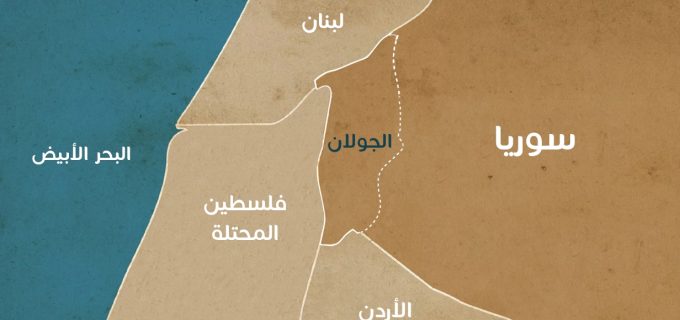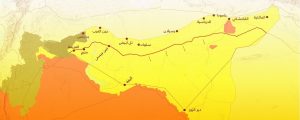On March 25, 2019, US President Donald Trump signed an executive order stipulating the US recognition of Israeli sovereignty over the occupied Golan Heights in the presence of Israeli Prime Minister Benjamin Netanyahu, who described the decision as “historic” as no former US administration has taken such a step since Israel’s occupation of the Golan in 1967.
Unlike the recognition of Jerusalem as the capital of Israel, the decision to acknowledge Israel’s sovereignty over the occupied Golan was not issued through the Congress, via legislation, but rather proclaimed by the US Government led by Donald Trump.
The decision, which preceded the Israeli elections, was described as a “kiss of life” to save Israeli Prime Minister Benjamin Netanyahu, who faced three corruption charges that posed a real threat to his victory in the Knesset elections. Despite the security related justifications presented by the US administration to vindicate its decision on the Golan, Arab and Western countries, as well as China, Russia and international institutions, have rejected the US decision over the Golan Heights, and considered it as a dangerous precedent in international relations.
The decision also constitutes a real threat to highly sensitive issues interfering with the Arab-Israeli and Palestinian-Israeli relations. Such resolution undermines all previous peace efforts in the region and further aggravates the state of conflict. On the other hand, this decision is perilous as it may encourage the use of force instead of politics in resolving conflicts, not only in the Arab region, but also at a global scale.
What are the political and strategic motives and implications of such a bold decision on regional and international security? What are the coming steps for Washington and Tel Aviv in light of the international and Arab powers’ failure to stand against the American and Israeli scheme?
The issue of the Golan: A background
Tweeting few words regarding the Golan Heights, Donald Trump has managed to ruin half a century of US policy in the Middle East. Thus, the US decision to recognize the Israeli sovereignty over the Golan Heights came as part of a series of unprecedented and shocking decisions that affected the United States’ policy, especially toward the Arab-Israeli conflict.
The US has always been committed to respecting the UN Security Council Resolution 242, which was adopted after the Israeli occupation of the Golan Heights by force after the defeat of the Arabs in the 1967 Six-Day War. The resolution referred to the “inadmissibility of the acquisition of territory by war” and stressed that maintaining “a just and lasting peace” necessitates the withdrawal of the Israeli armed forces from the occupied territories. This text was employed as the basis for subsequent discussions on the Arab-Israeli conflict.
Despite the American-Israeli rapprochement, the successive US administrations have always worked to respect this text and did not declare support or try to legitimize the Israeli presence in the Golan. The US also took a stand against the de facto policy implemented by Israel for imposing its legal and legislative sovereignty on the Golan Heights by force in 1981. Despite Ronald Reagan’s protest against the Israeli move, at that time, the occupation forces did not withdraw from the Golan.
Afterward, the US position toward the issue remained neutral. However, realizing the danger of endorsing the Israeli occupation on international relations in general and the security of the Middle East region in particular, no former American president has ever decided to move on to legitimize the Israeli presence in this particular region.
Although the size of Golan Heights is geographically limited, i.e. 1,800 km in height, no more than 74 km in width and barely 27 km in breadth, it might transform the geopolitical features of the entire Arab region. The importance of the Golan is not related its geographical features, but rather to its geopolitical significance as one of three most prominent issues linked to the Arab-Israeli conflict since the rise of the Zionist entity in Palestine in 1948.
The three issues, which are related to the Golan, Sinai, and the West Bank, have shaped the Arab-Israeli conflict for half a century and have been raised in various initiatives and negotiations that sought to resolve these three issues away from armed conflict. The Arab Peace Initiative, which was the most significant peace project regarding this subject, has led to the normalization of Egyptian-Israeli relations in a historic agreement signed by former Egyptian President Anwar Sadat and Israeli Prime Minister, Menachem Begin. The accord has granted Egypt sovereignty over Sinai again in exchange for peace with Israel.
Despite attempts by successive US administrations to apply the same principle to Syria, Hafez al-Assad’s Syria treated the initiative cautiously, and no agreement was reached between the Syrian and Israeli sides. Despite the fact that Israel has imposed a fait accompli on the Golan Heights since 1981, al-Assad has committed himself not to engage in a direct war for the restoration of the land,; while there have been reports about mutual coordination between both sides.
Due to the sudden decision of the US administration to officially recognize Israel’s annexation of the Golan Heights, the West Bank issue has entered the danger zone, especially since the voices of Israel’s right-wing rose more intensely following the US administration’s daring declaration of Jerusalem as the capital of Israel.
Golan Heights’ relation to US strategy
The significance of the Golan Heights to the US lies in the fact that this specific area is a danger zone for its Israeli ally in the Middle East, in addition to being an important source for Israel to meet different vital and economic needs. Hence, the US decision over the Golan was based on a strategy to secure Israel, on the one hand, and guarantee stability in the Middle East, on the other. In spite of the importance of the Golan’s geopolitical location and its impact on Israel’s military security, Israel’s control over the area is not limited to ensuring its military presence.
Thus, Israel’s water security is at the top of the list of priorities. In fact, Israel receives 40 percent of its water needs from the Golan Heights, in addition to oil exploration mission, which were initiated since 2014, tourism and investments. Today in the Golan, the number of settlers has reached about 20.000.
As for the Arab side, the issue of the Golan is highly sensitive as far as the Arab-Israeli relationship is concerned. The issue has been suspended for half a century as no fair solution that can satisfy the various parties has been reached. The fact that no political side has recognized or legitimized Israel’s presence in the Golan Heights has given the Arab-Israeli negotiation process momentum in various issues. However, the US decision has destroyed the foundations of negotiations on the pretext of the absence of a final solution. Thereof, any peace process or negotiation will be doomed to failure.
International angry yet futile reactions
The decision to transfer the US embassy to Jerusalem and to recognize it as the capital of Israel has not been met with the same angry tone at the international and regional levels, as was the case with Trump’s decision to declare Israeli sovereignty over the Golan Heights, which Israel occupied by force in 1967.
Some considered the US decision over the Golan as the final nail in the coffin of the US peace initiative in the region, while others believed that such a move represents a dangerous precedent that undermines what has been called the international system, which emphasizes the need to rely on negotiation and political dialogue rather than conflict and military interventions that could lead to a devastating World War III.
On behalf of the Syrian regime, Foreign Minister Walid al-Muallem, called the US decision over the Golan a blatant violation of the sovereignty and territorial integrity of Syria, in addition to constituting the highest degree of contempt for international legitimacy and a disgraceful slap to the international community. By issuing such a decision, the UN has lost its status and credibility due to the US breach of its resolutions on the occupied Syrian Golan, in particular resolution 497 of 1981, which affirms the legal status of the Syrian Golan as an occupied territory and rejects the annexation of the area to the Zionist entity, thus, nullifying the legal validity of any Israeli attempt to take over the area.
The Gulf States, led by Saudi Arabia, declared their rejection of the US decision, which “has significant drawbacks on the peace process in the Middle East.” The Foreign Affairs Minister of the Palestinian National Authority also condemned the decision and considered it as “an escalation of the US president’s rebellion on the positions and policies of previous administrations, an explicit aggression against the Arabs’ rights, and flagrant violation of international legitimacy and its resolutions”.
On behalf of the Jordanian kingdom, Foreign Minister, Ayman Safadi, condemned the US decision, stressing that “although the US position will increase tension in the region,; it will not change the fact that the occupied Golan is a Syrian territory. Achieving a comprehensive and lasting peace requires ending the occupation of the Golan in accordance with the resolutions of international legitimacy and the Arab Peace Initiative”.
Lebanese government considered that the US recognition of Israel’s sovereignty over the Golan undermines all peace efforts, highlighting that “the land-for-peace principle will become invalid when there is neither a land to be returned, nor a peace to be granted.”
On behalf of the Arab League, Secretary-General, Ahmed Aboul Gheit, renounced the US decision and considered it as “unfounded as it reflects the US administration’s violation of international law, spirit and text, and scale down the status of the US in the region, and even worldwide.”
Aboul Gheit stressed that “the Arabs reject this approach. If the seizure of land using force is a major crime, legitimizing the act of occupation is a no less serious error. Force does not legitimize rights and does not entail benefits. The international law cannot be made by one single state, regardless of its status, and the continuity of occupation either for a long or short period of time, will never grant occupiers legitimacy. “
Arab countries were not the only side to react as the members of the UN Security Council, such as Germany, France, the United Kingdom, Belgium, and Poland have also declared their rejection of the US decision. The Ambassadors of these countries, in accordance with the resolutions of the UN, stated: “We do not recognize the sovereignty of Israel in the territories occupied since June, 1967, including the Golan Heights, which we do not consider part of the territory of the state of Israel”.
The Turkish position has been made clear by Turkish Foreign Minister Mevlüt Çavuşoğlu, who stressed that it is impossible for his country to accept the US decision on the Golan, and that it will take action against it, even at the United Nations. The Iranian position came in the same context, which described the decision as “colonial par excellence.”
In contrast, the American Stratfor Center for Strategic and Security Studies has considered Trump’s decision as a vital step in a broad restructuring process by the United States of the agreed standards for managing the world order since the end of World War II. The most important of these standards, in the current world order, is the international forces’ consensus on the refusal to seize territories by military force.
The declaration of Jerusalem as the capital of Israel, in addition to the recent decision on the Golan Heights, are part of many similar US approaches in the past two years, including the renunciation of international agreements such as the Paris Agreement on Climate Change and the Iranian Nuclear Deal, the expansion of trade wars and the use of tariff weapons not only against competitors, but also against allies.
Daniel Charles Kurtzer, former US ambassador to Egypt and Israel, pointed out that US recognition of Israeli sovereignty over the Golan Heights will not serve the US national interests, nor will it significantly enhance Israeli security. It may rather harm the peace process in the region in general. He stressed that it is better for the United States to focus on “the hostilities of Iranian and Russian forces, and their support for the government of President Bashar al-Assad.”
The resolution’s repercussions on international order and security
Winning a fifth term, Prime Minister Benjamin Netanyahu becomes the longest-serving prime minister in the history of the Zionist entity. This can be interpreted as part of the implicit justifications accompanying the security arguments for the US decision towards the Golan Heights.
Some analysts considered the timing of the decision to annex the Golan to the Israeli entity as a gift from US President Donald Trump to his close friend Netanyahu, who underwent a fateful battle in the Israeli Knesset elections over three corruption cases that would almost have overthrown him if it were not for Trump’s proactive steps in support of his friend’s power in the Israeli Knesset.
In contrast, some consider that Trump’s decision as an attempt to lure the evangelical voters in the US for his benefit in the US elections of 2020. In addition, the decision comes as part of the exceptional decisions that US President Donald Trump has taken to prove his presence as a unique president in the US history.
Whatever the justifications for the US position on the Golan are, no one can deny the seriousness of the situation that such a decision will result in at the international and regional levels. The dangerous aspects of this decision can be understood by focusing on the following points:
‐ This decision is a dangerous precedent in the context of international relations, as it legitimizes the process of attacking the countries’ sovereignty and forcibly taking over territories, and paves the way for a third world war.
‐ This decision will affect the progress of critical files issues, as it further complicates a number of major border conflicts around the world, such as the Russian seizure of the Crimea Peninsula and the Chinese demands to annex the South China Sea. Because of Trump’s decision, the US position will be weakened if he opposes the legitimization of these demands.
‐ The American bias toward the Israeli side, manifested in the declaration of Jerusalem as the capital of Israel and the recent declaration of Israel’s sovereignty over the Golan Heights, weakens the USA’s role as a mediator in the peace negotiations between the Arab and Israeli sides.
‐ This decision is considered a blow to the US peace efforts in the Middle East. Trump’s tweet has blown the US policy on critical issues in the Middle East. The sudden US decision has blown away the basic rules on which all peace negotiations have been based, reinforcing the logic of force and the continuation of conflict.
Conclusion
In light of the accelerating changes in the Arab region after the Arab Spring on the one hand, and after the effects of the reckless decisions taken by US President Donald Trump, without taking into account any strategic interests of the US relations in the region, on the other hand, his recent decision on the Golan Heights further complicates the security situation at two levels: a regional level relating to the Middle East, and a global one related to international security and peace.
The American decision on the Golan will significantly complicate the security situation in the Middle East and will negatively affect any peace process in the region, especially with regard to the West Bank, which is currently considered as the most important file to be focused on in the next phase. Netanyahu’s winning in the elections will strengthen right-wingers’ pressure on him to annex areas of the West Bank, unless efforts unite for the pressure and escalation on previous issues such as the transfer of the US embassy to Jerusalem and the declaration of Israeli sovereignty over the Golan Heights, before the start of any dialogue or peace process.
At the international level, the greatest negative impact of this decision may be the justification of the logic of power in the violation of the countries’ sovereignty on the pretext of preserving the security and the supreme interests of powerful countries. Nowadays, the world order is no longer balanced after the fall of the Soviet Union. Despite the US’s domination of military superiority worldwide, there are other competing forces. While it shows an adherence to the standards of the world order, the USA is still violating these values, legitimizing and justifying this as force and preservation of interests.







